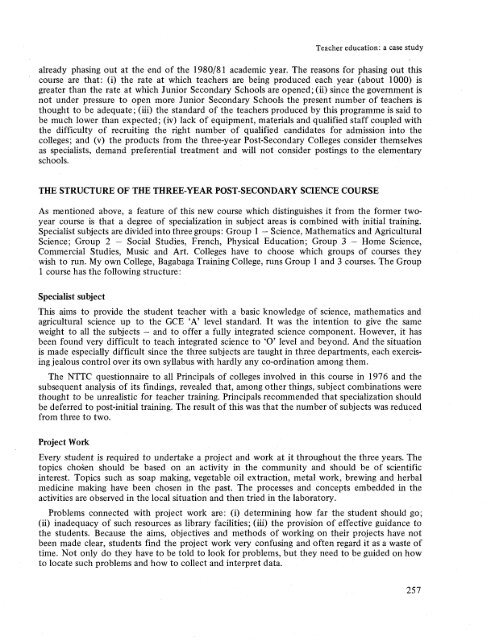New trends in physics teaching, v.4; The ... - unesdoc - Unesco
New trends in physics teaching, v.4; The ... - unesdoc - Unesco
New trends in physics teaching, v.4; The ... - unesdoc - Unesco
You also want an ePaper? Increase the reach of your titles
YUMPU automatically turns print PDFs into web optimized ePapers that Google loves.
Teacher education: a case study<br />
already phas<strong>in</strong>g out at the end of the 1980/8 1 academic year. <strong>The</strong> reasons for phas<strong>in</strong>g out this<br />
course are that: (i) the rate at which teachers are be<strong>in</strong>g produced each year (about 1000) is<br />
greater than the rate at which Junior Secondary Schools are opened; (ii) s<strong>in</strong>ce the government is<br />
not under pressure to open more Junior Secondary Schools the present number of teachers is<br />
thought to be adequate; (iii) the standard of the teachers produced by this programme is said to<br />
be much lower than expected; (iv) lack of equipment, materials and qualified staff coupled with<br />
the difficulty of recruit<strong>in</strong>g the right number of qualified candidates for admission <strong>in</strong>to the<br />
colleges; and (v) the products from the three-year Post-Secondary Colleges consider themselves<br />
as specialists, demand preferential treatment and wil not consider post<strong>in</strong>gs to the elementary<br />
schools.<br />
THE STRUCTURE OF THE THREE-YEAR POST-SECONDARY SCIENCE COURSE<br />
As mentioned above, a feature of this new course which dist<strong>in</strong>guishes it from the former twoyear<br />
course is that a degree of specialization <strong>in</strong> subject areas is comb<strong>in</strong>ed with <strong>in</strong>itial tra<strong>in</strong><strong>in</strong>g.<br />
Specialist subjects are divided <strong>in</strong>to three groups: Group 1 - Science, Mathematics and Agricultural<br />
Science; Group 2 - Social Studies, French, Physical Education; Group 3 - Home Science,<br />
Commercial Studies, Music and Art. Colleges have to choose which groups of courses they<br />
wish to run. My own College, Bagabaga Tra<strong>in</strong><strong>in</strong>g College, runs Group 1 and 3 courses. <strong>The</strong> Group<br />
1 course has the follow<strong>in</strong>g structure:<br />
Specialist subject<br />
This aims to provide the student teacher with a basic knowledge of science, mathematics and<br />
agricultural science up to the GCE ‘A’ level standard. It was the <strong>in</strong>tention to give the same<br />
weight to all the subjects - and to offer a fully <strong>in</strong>tegrated science component. However, it has<br />
been found very difficult to teach <strong>in</strong>tegrated science to ‘0’ level and beyond. And the situation<br />
is made especially difficult s<strong>in</strong>ce the three subjects are taught <strong>in</strong> three departments, each exercis<strong>in</strong>g<br />
jealous control over its own syllabus with hardly any co-ord<strong>in</strong>ation among them.<br />
<strong>The</strong> NTTC questionnaire to all Pr<strong>in</strong>cipals of colleges <strong>in</strong>volved <strong>in</strong> this course <strong>in</strong> 1976 and the<br />
subsequent analysis of its f<strong>in</strong>d<strong>in</strong>gs, revealed that, among other th<strong>in</strong>gs, subject comb<strong>in</strong>ations were<br />
thought to be unrealistic for teacher tra<strong>in</strong><strong>in</strong>g. Pr<strong>in</strong>cipals recommended that specialization should<br />
be deferred to post-<strong>in</strong>itial tra<strong>in</strong><strong>in</strong>g. <strong>The</strong> result of this was that the number of subjects was reduced<br />
from three to two.<br />
Project Work<br />
Every student is required to undertake a project and work at it throughout the three years. <strong>The</strong><br />
topics chosen should be based on an activity <strong>in</strong> the community and should be of scientific<br />
<strong>in</strong>terest. Topics such as soap mak<strong>in</strong>g, vegetable oil extraction, metal work, brew<strong>in</strong>g and herbal<br />
medic<strong>in</strong>e mak<strong>in</strong>g have been chosen <strong>in</strong> the past. <strong>The</strong> processes and concepts embedded <strong>in</strong> the<br />
activities are observed <strong>in</strong> the local situation and then tried <strong>in</strong> the laboratory.<br />
Problems connected with project work are: (i) determ<strong>in</strong><strong>in</strong>g how far the student should go;<br />
(ii) <strong>in</strong>adequacy of such resources as library facilities; (iii) the provision of effective guidance to<br />
the students. Because the aims, objectives and methods of work<strong>in</strong>g on their projects have not<br />
been made clear, students f<strong>in</strong>d the project work very confus<strong>in</strong>g and often regard it as a waste of<br />
time. Not only do they have to be told to look for problems, but they need to be guided on how<br />
to locate such problems and how to collect and <strong>in</strong>terpret data.<br />
257
















